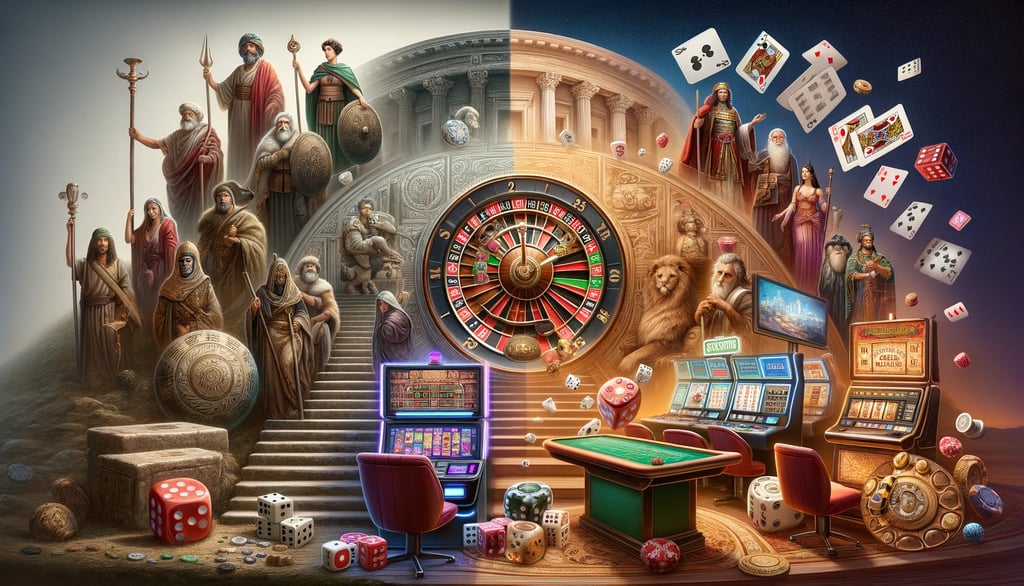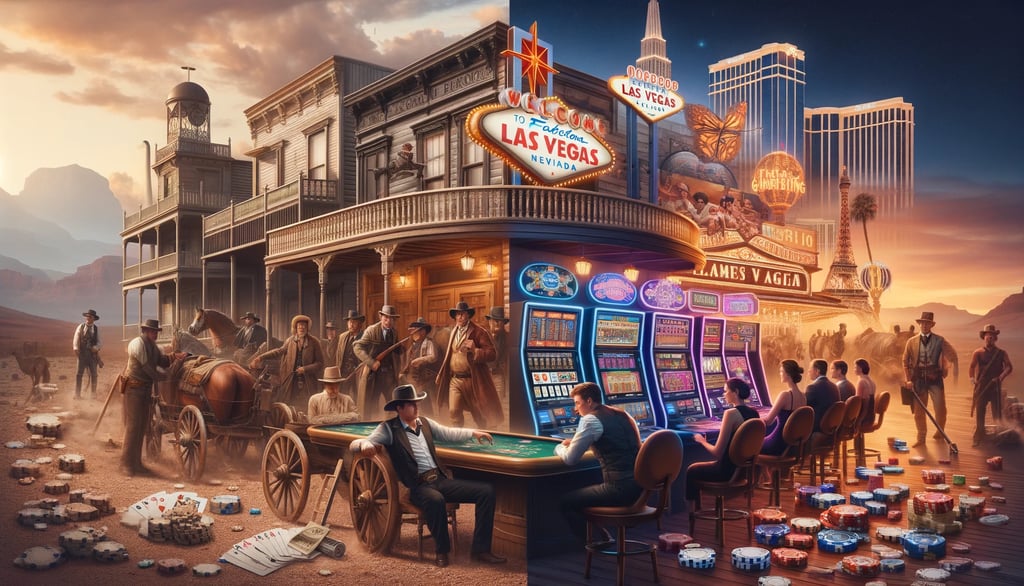A Brief History of Gambling: Origins, Evolution, Global Impact and Famous Gamblers
ONLINE CASINOSPORTS BETTINGPOKERGENERAL
K. Arthur
2/11/20248 min read
Gambling, a pastime as ancient as civilization itself, has been a pivotal element in human history, weaving its intricate patterns through countless cultures and epochs. From the casting of lots in the dimly lit corridors of antiquity to the dazzling lights of Las Vegas and the digital realms of online platforms like Bovada, gambling's journey is a testament to its enduring allure and significant impact on societies worldwide.
This article embarks on a fascinating odyssey, tracing the origins and transformations of gambling across time and continents. We delve into the stories of legendary gamblers who've left their indelible marks on history, explore how gambling has shaped and been shaped by various cultures, and consider the evolution of this ubiquitous activity into its modern incarnations, including the innovative offerings and generous welcome bonuses, such as Bovada's $3750, that continue to attract aficionados in the digital age.
Join us as we explore the captivating world of gambling, uncovering its historical roots, cultural nuances, and the timeless allure that keeps the world betting against the odds.
Timeline highlighting key milestones in the history of gambling:
3000 B.C.: Earliest evidence of dice in Egypt and Mesopotamia.
600 B.C.: First coins minted in Lydia, modern-day Turkey.
9th Century: Introduction of playing cards in Ancient China.
1638: Opening of the world's first casino, Casino di Venezia, in Italy.
Late 19th Century: Invention of the slot machine.
1931: Legalization of gambling in Nevada, leading to the development of Las Vegas.
1970s: Introduction of the first video slot machine.
1994: Establishment of the first online casino.
Ancient Civilizations and the Roots of Gambling
In ancient times, gambling was deeply intertwined with religious and social practices. The oldest known dice, dating back to 3000-2500 BC in southern Iran, signify one of the earliest forms of gambling. Ancient Egyptians, for example, are believed to be the first culture to gamble for money, playing games like senet. Similar patterns of gambling activities were present in ancient Greece and Rome, where it was both a popular pastime and a ritualistic activity. Games like pai gow in ancient China further demonstrate the global pervasiveness of gambling from early on.
In Ancient Rome, gambling was not only a popular pastime but also a ritualistic practice. The casting of lots was a common method for making decisions and determining the will of the gods, a practice so ingrained in Roman culture that it is mentioned in historical texts, including accounts of soldiers casting lots for the garments of Jesus Christ. This method of divining the future underscores the profound link between gambling and the divine, where chance outcomes were interpreted as signs of divine will.
The Greeks, too, held gambling in high regard, integrating it into their mythology and daily life. Gambling games, particularly dice games, were widespread in Ancient Greece, where gods like Hermes and Pan were believed to be patrons of gamblers, and even the mightiest of gods, Zeus, Hades, and Poseidon, were said to have gambled to divide the universe among themselves. Such myths reflect the cultural significance of gambling as a divine activity, with high stakes involving the very fabric of the cosmos. The Greeks recognized the potential for gambling to become problematic, leading to government measures to regulate it, acknowledging its powerful grip on society and its capacity to disrupt order.
In Ancient China, gambling took on a different form with the invention of keno, a game that bears resemblance to modern lotteries. Players would select numbers on a card, hoping to match them with drawn numbers to win. This game was not only a form of entertainment but also a means of funding state projects, demonstrating an early understanding of gambling's potential for social utility. The Chinese contribution to gambling extends to the creation of playing cards, a legacy that has endured through millennia, evolving into the myriad card games enjoyed worldwide today. These innovations highlight the role of gambling in fostering social connections and economic development, further cementing its place in the cultural and spiritual life of ancient civilizations.
Experience the Thrill of Modern Gambling with Bovada
As we delve into gambling's storied past, it's thrilling to consider the modern opportunities available. Bovada, a premier online platform, seamlessly blends tradition with cutting-edge technology, inviting enthusiasts to partake in a world of digital casino games, sports betting, and poker. Offering a generous welcome bonus of up to $3,750 for new members, Bovada ensures the spirit of gambling not only endures but thrives, engaging new generations in this timeless pursuit. Join Bovada today and step into a realm where history and innovation converge.
The Cultural Evolution of Gambling
As gambling spread, it mirrored the social and economic contours of societies, evolving into various forms across cultures. In medieval Europe, the dichotomy of gambling's acceptance and prohibition underlined its unwavering popularity, despite the moral and legal battles waged by religious and secular authorities. This evolution from a frowned-upon activity to an organized, sanctioned endeavor underscores the adaptability and enduring appeal of gambling.
As societies evolved, so did the nature and scope of gambling. The Middle Ages saw the rise of gambling as a popular activity among knights and nobility, often associated with chivalry and social status. However, it was in the 17th century that gambling began to take on a more organized form with the opening of the Ridotto in Venice in 1638, considered the world's first legal casino. This period marked the beginning of gambling's institutionalization, laying the groundwork for the modern gambling industry.
The 19th and early 20th centuries witnessed the proliferation of gambling across Europe and America, with the establishment of iconic casinos in Monte Carlo and Las Vegas. These developments coincided with the industrial revolution and the rise of consumer culture, as gambling became more accessible to the broader public. The invention of slot machines and the popularity of card games like poker and blackjack during this time further democratized gambling, making it a widespread form of entertainment.
Gambling in America: A Reflection of Society
The story of gambling in America is a fascinating journey through the nation's cultural and economic transformations. In its early days, gambling arrived with the first settlers and was met with mixed attitudes. By the 19th century, it had become a tolerated, if not entirely accepted, part of society, particularly in places like New Orleans, which emerged as a gambling mecca despite widespread legal prohibitions.
Horse racing, initially a pastime for the very rich, found a broader audience post-Civil War in the Northeast, thanks to elite jockey clubs. These races attracted both affluent audiences and working-class bettors, reflecting the social strata of the time. Chicago's rapid industrialization brought gambling to its working-class neighborhoods, offering a form of escape and entertainment, while also opening doors for organized crime to take root in the gambling scene.
The turn of the 20th century saw a crackdown on gambling activities, with laws enforced more strictly and a moral push against it, led by evangelical movements. This period witnessed the closure of many race tracks and the outlawing of lotteries and casinos in several states. However, the Great Depression marked a turning point, with some forms of gambling like bingo being legalized to raise funds for charity, and by the 1930s, 21 states had legalized horse racing.
Nevada's legalization of casino gambling in 1931 was a pivotal moment, initially driven by the need to raise state revenue during tough economic times. This move, coupled with changes to divorce laws and the construction of the Hoover Dam, transformed Nevada, especially Las Vegas, into a gambling and entertainment hub. Despite initial skepticism, the gambling industry flourished, attracting investment from organized crime during Prohibition and beyond, which played a significant role in the development of the iconic Las Vegas Strip.
The post-World War II era saw a boom in casino gambling, driven by a surge in tourism and economic optimism. The establishment of the Nevada Gaming Control Board and the Nevada Gaming Commission in the 1950s marked the beginning of regulated, corporate growth in the industry, setting the stage for Las Vegas' rise as a global gambling destination.
The Digital Revolution: Gambling in the 21st Century
The digital revolution has significantly transformed the gambling landscape in the 21st century, making it more accessible, diverse, and integrated into the digital economy. This transformation is largely driven by advancements in technology, regulatory changes, and shifts in consumer behavior, which have collectively contributed to the exponential growth of the online gambling industry.
The global online gambling market, valued at USD 63.53 billion in 2022, is anticipated to grow at a CAGR of 11.7% from 2023 to 2030. This growth is underpinned by the widespread use of smartphones and the internet, allowing for gambling activities to be easily accessible to users worldwide. Regions like North America, particularly New Jersey, have emerged as significant markets for regulated online gambling, with the sector expected to further expand as more regions normalize online gambling through legislation.
Technological innovations such as Virtual Reality (VR) and Blockchain have enhanced the online gambling experience, offering more immersive and secure gaming environments. VR technology allows players to experience a more realistic gambling environment, while blockchain technology provides secure, transparent transactions, making online payments safer and more efficient for users. The adoption of cryptocurrencies in online gambling platforms has further facilitated fast and secure transactions, attracting a broader user base.
The economic impact of online gambling extends beyond mere revenue generation. It has created numerous job opportunities, contributed to technological innovation, and significantly impacted regional economies. In regions like Europe, which holds a substantial share of the online gambling market, the industry has thrived due to favorable regulatory environments and high internet penetration.
However, the growth of online gambling also presents challenges, including the need for robust regulatory frameworks to ensure fair and responsible gambling practices. As the industry continues to evolve, addressing these challenges will be crucial to sustain its growth and mitigate potential negative impacts on society.
Famous Gamblers in History
The history of gambling is dotted with famous gamblers whose exploits have become legendary. Names like Archie Karas, known for the longest and largest documented winning streak in casino history, and Nick Dandalos, who inspired the World Series of Poker, stand out. Phil Ivey, recognized for winning ten World Series of Poker bracelets, and Doyle Brunson, a poker legend with a career spanning over 50 years, are also iconic. Wild Bill Hickok, an Old West hero known for being shot while playing poker, and Edward O. Thorp, the father of card counting, are equally fascinating figures. Their stories range from astonishing winning streaks to significant contributions to the gambling world, making them some of the most celebrated individuals in the history of gambling.
Gambling's journey from ancient divination practices to the virtual gambling halls of the internet encapsulates a broader narrative about human society and its relationship with risk, reward, and fate. This exploration into the historical and cultural aspects of gambling reveals not only the evolution of a pastime but also its significant impact on the development of societies and cultures. As we look towards the future, it's clear that gambling will continue to adapt and thrive, reflecting the changing values, technologies, and laws of human civilization.
For those intrigued by the allure of gambling and wishing to partake in its modern iterations, platforms like Bovada offer a seamless blend of tradition and technology.
With a generous welcome bonus of $3750, Bovada invites enthusiasts to experience the thrill of gambling in a contemporary, digital format, ensuring the legacy of gambling continues to evolve and captivate new generations.
AFFILIATE DISCLOSURE: If you wager at an online casino/sportsbook through one of our links, we may earn an affiliate commission.
DISCLAIMER: Online Wagering is illegal in some Jurisdictions. It is your responsibility to check your local regulations before playing online. Deposit&Play takes no responsibility for your actions.
Depositandplay.com | ©2026 - All Rights Reserved
Must be 21+ years or older to gamble. Gamble Responsibly.




